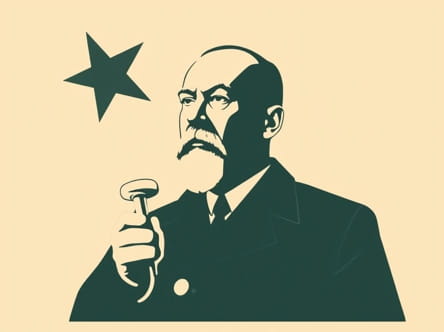In the midst of Russia’s political chaos in 1917, Vladimir Lenin emerged as the revolutionary force that would change the course of history. His role in the Bolshevik Revolution was not only pivotal but transformative, shaping the ideology, organization, and strategic direction of the uprising. Lenin’s leadership, vision, and tactical brilliance helped the Bolsheviks seize power and establish the world’s first communist state. His influence on the Russian Revolution, the founding of the Soviet Union, and the spread of Marxist ideas globally remains one of the most significant political legacies of the 20th century.
Lenin’s Revolutionary Background
Early Political Involvement
Lenin, born Vladimir Ilyich Ulyanov in 1870, became radicalized after the execution of his brother for plotting to assassinate Tsar Alexander III. This personal tragedy ignited his interest in revolutionary politics, particularly Marxism. He soon joined underground movements that aimed to overthrow the autocratic Tsarist regime and replace it with a socialist government.
Formation of the Bolshevik Party
In 1903, Lenin played a central role in splitting the Russian Social Democratic Labour Party into two factions: the Bolsheviks and the Mensheviks. He insisted on a disciplined, professional revolutionary party led by a central committee, contrasting with the Mensheviks’ preference for a broad-based, democratic movement. Lenin’s faction became the Bolsheviks, meaning majority, and he would lead them until his death.
Lenin’s Leadership in 1917
Return from Exile
At the outbreak of the February Revolution in 1917, Lenin was in exile in Switzerland. With Germany’s assistance, he returned to Russia via a sealed train, viewing the Russian political crisis as a golden opportunity to bring Marxist revolution to life. He arrived in Petrograd (now St. Petersburg) in April 1917 and quickly began rallying support among workers, soldiers, and radicals.
The April Theses
Lenin’s famous April Theses outlined his vision for revolution:
- End to the war (World War I) immediately
- Transfer of power to the Soviets (workers’ councils)
- Confiscation of land from landlords
- Nationalization of banks
- Establishment of a socialist state
These radical demands distinguished Lenin and the Bolsheviks from other socialist groups and earned him the unwavering support of disillusioned workers and peasants.
Strategic Use of Propaganda and Organization
Use of Slogans
Lenin popularized simple yet powerful slogans like Peace, Land, and Bread and All Power to the Soviets, which captured the mood of the Russian masses. These slogans appealed to war-weary soldiers, land-hungry peasants, and factory workers suffering from inflation and food shortages.
Centralized Control
Lenin’s insistence on tight party control allowed the Bolsheviks to operate efficiently and decisively. He emphasized democratic centralism decisions made centrally would be binding on all members. This structure gave the Bolsheviks a strategic advantage over more fragmented political groups during times of crisis.
Lenin and the October Revolution
Planning the Uprising
Lenin spent much of 1917 pushing the Bolsheviks to prepare for armed insurrection. While some party members hesitated, he convinced them that the Provisional Government was weak and could be overthrown. With support from the Petrograd Soviet and the Red Guards (armed workers), Lenin set the date for the revolution.
Seizure of Power
On the night of October 25 (Julian calendar), 1917, the Bolsheviks launched their coup. With little resistance, they captured key locations in Petrograd, including the Winter Palace, seat of the Provisional Government. Lenin emerged to announce that the Soviets had taken power. This moment marked the birth of Soviet Russia and the beginning of the communist era.
Post-Revolution Contributions
Decrees and Reforms
After the revolution, Lenin issued a series of decrees to solidify Bolshevik power:
- The Decree on Land: redistributing land to peasants
- The Decree on Peace: proposing immediate withdrawal from WWI
- The Decree on Workers’ Control: giving workers authority over factories
These reforms aimed to deliver on the Bolsheviks’ promises and ensure public support.
Founding the Soviet State
Lenin was instrumental in forming the Soviet government structure, creating the Council of People’s Commissars (Sovnarkom), with himself as the head. He emphasized the role of the Communist Party as the guiding force of the state and laid the foundation for future Soviet governance.
War Communism and the Civil War
Policies During Civil War
From 1918 to 1921, Lenin led the Bolsheviks during the Russian Civil War against the anti-Bolshevik White forces. His government implemented War Communism, which involved nationalizing industry, requisitioning grain, and suppressing opposition. Though harsh, these measures helped the Bolsheviks maintain power during wartime.
Use of the Cheka
Lenin authorized the creation of the Cheka, a secret police force that targeted counter-revolutionaries and dissidents. While controversial, Lenin viewed this as necessary to protect the revolution. This marked the beginning of a repressive state apparatus that would expand under Stalin.
Legacy and Long-Term Impact
New Economic Policy
By 1921, Lenin recognized that War Communism had damaged the economy and alienated the peasantry. He introduced the New Economic Policy (NEP), which allowed limited private enterprise and market mechanisms. This pragmatic shift stabilized the country and preserved Bolshevik rule.
Death and Succession
Lenin suffered a series of strokes and died in 1924. His death created a power vacuum that eventually led to Joseph Stalin’s rise. Lenin’s writings and revolutionary legacy continued to influence global communist movements for decades, even as his successors interpreted his ideas differently.
The role of Lenin in the Bolshevik Revolution was unmatched in scope and influence. His ability to combine ideological clarity with tactical flexibility enabled him to lead the Bolsheviks to power and lay the foundations of the Soviet state. Lenin’s revolutionary vision, strategic leadership, and unwavering commitment to Marxism made him a central figure in 20th-century history. While his methods and policies remain subject to debate, his impact on the Russian Revolution and global politics is undeniable. The Bolshevik Revolution could not have succeeded without Lenin’s decisive leadership, and his legacy continues to shape political thought and historical discourse around the world.
